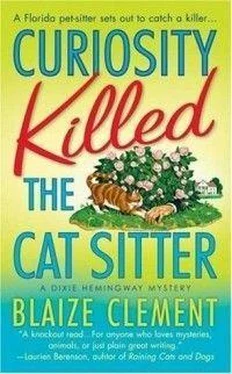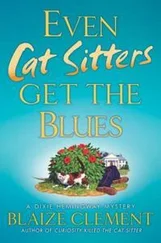She shoved him the rest of the way in and took the opposite seat. “Now you behave yourself,” she said. “You sit there and be quiet.”
Judy came to take the woman’s order, and the kid and I turned our eyes away from them. I sipped coffee and watched his hands fiddle with the bundle of flatware rolled into a paper napkin. His hands were broad, with long skinny fingers and knobby knuckles.
To the tabletop, he said, “I know you saw me last night.”
“I heard you, too. You were terrific.”
He shrugged and blushed. It was hard to believe he was the same person as the confident pianist of the night before.
“The waiter said your name was Phil.”
He blinked a couple of times and said, “It’s Phillip, really.” The poor kid couldn’t even come up with a decent alias.
I said, “Do you play regularly at the Crab House?”
“Yeah. From eleven to one.” He raised bloodshot eyes to me. “I climb out my window and walk over there.”
“Ahhhh. So I guess that means your folks don’t know about it.”
He gave a choked laugh. “Among other things.”
“You must not get much sleep.”
“School will be out in a couple of months, and I’ll be leaving in August.”
“For Juilliard.”
“Yeah.”
“Are you excited about that, going to Juilliard?”
“Sure.”
“Your mom’s really proud of you.”
“Yeah, it’s all she talks about. She has lots of scrap-books and pictures.”
I had a quick image of Olga Winnick alone in that darkened house, working on her photo albums and scrap-books, creating records of a happy family that didn’t exist. Phillip was her way of vindicating herself to the world, but the woman didn’t know her real son, she only knew the one she had created.
“How’d you get the job at the bar?”
He flashed me a quick look that was almost sly. “Somebody I knew told the owner about me. He had me audition and hired me.”
I would have bet good money that the somebody he knew was also an older lover. He raised his head and looked at me head-on. “Are you going to tell my folks?”
I rotated my coffee mug and realized I hadn’t even considered telling them. I’m not sure what that says about me, but that’s how it was.
“If you were my son, I’d want to know that you were climbing out a window and playing at a bar. But you’re not my son, and you’re what, eighteen? Anyway, it’s none of my business. I think you’re probably not getting enough sleep, but other than that, I don’t see anything wrong with it. It’s an honest job, the place is safe, and it gives you a chance to do what you like to do.”
He kept looking at me, waiting for something else.
I smiled. “That’s all, Phillip.”
Judy came with a coffeepot in one hand and my breakfast in the other.
Phillip said, “If it’s not too much trouble, I think I’d like some pancakes.”
“No trouble at all. You want bacon or sausage with them?”
“Yes, ma’am.”
“Which?”
“I guess both.”
Nothing stimulates your appetite like finding out you’re not hopelessly doomed after all.
I tucked into my eggs for a while, and he rhythmically tapped his fingers on the table. His hand span was probably twice as wide as my two hands laid side by side.
Across the aisle, the little boy said, “Look, Mama! A moon!”
He was holding up a triangle of toast with a bite mark in its center. The shape did look a little moonlike. He was a smart kid, noticing something like that so young.
With her cheeks swelled with hunks of sausage, his mother said, “Schtop playing wif your food.”
His face fell and he bent his head back to his cereal.
Phillip said, “The police came and talked to my mom and dad and me about that murder.”
“They’re not police,” I said. “They’re from the Sheriff’s Department.”
“Oh. Well, they asked if we’d seen anything over there, or if we’d heard anything.”
“Did you?”
He blushed, shifted in his seat, and looked out the window. “Not really.”
Judy swished to the table with a plate of pancakes and another plate piled high with bacon and sausages. “More apple juice?”
“Yes, ma’am, if it’s not too much trouble.”
She sped off to get his juice while I eyed his bacon and thought about what “Not really” meant.
Judy came back with another glass of juice and poured more coffee in my cup. “Anything else?”
“We’re fine,” I said.
Across the aisle, the woman said, “You eat every bite of that. You wanted it, you eat it. I’m not paying for shit you don’t eat.”
“Poor kid,” said Judy, and moved on with her coffeepot.
“Phillip, do you know Ms. Doerring very well?”
“Nnnn-nnnn.” He shook his head with his mouth full of pancake. I sipped coffee and watched him chew. He had put all the sausage on his plate but none of the bacon.
He swallowed and said, “My dad’s helped her with some things, but I’ve never even talked to her.”
I said, “Do you mind if I take one of your pieces of bacon? I don’t usually eat bacon, but that looks so good…”
“Oh, sure! Sure! That’s fine!” It was like taking candy from a baby.
Perfume companies ought to bottle the smell of crisp bacon. Forget pheromones. I’ll bet a woman with a little spot of bacon grease behind her ears would attract every male within a five-mile radius. Taking little bitty bites to make it last longer, I said, “What kind of things?”
It took him a minute to pick up where we’d left off. “Plumbing and stuff.”
“She calls him to do things like that?”
He chewed awhile and considered how to answer. “She doesn’t exactly call him. A few times her garage door has been open when he came home and she was out there, you know. I guess he saw her and went over to see if she needed any help.”
No matter how hard I tried, I could not imagine Marilee Doerring out in her garage getting down a plunger to unstop her toilet or searching for a washer to fix a dripping faucet.
“That’s nice of him.”
“Yeah.”
We both ate silently for a while, him taking huge forkfuls of food and me fighting down the rage I felt at the memory of Carl Winnick devoting an hour of radio time to say that Christy would not have been killed if I had been home where I was supposed to be instead of out acting like a man in a deputy’s uniform. He had even objected to the department giving me widow’s benefits, saying taxpayers shouldn’t have to reward me for being a bad wife and mother.
I studied Phillip’s face and reminded myself that the kid wasn’t his father. The kid wasn’t anything like his father. There was no reason to blame the kid because his father was an arrogant idiot.
I said, “I got the impression from your mom that she doesn’t like Ms. Doerring much.”
“My mom thinks she’s a slut,” he said. “She probably is.”
The easy way he said it took me by such surprise that I choked on a swig of coffee. While I coughed and sputtered and fanned my face with my napkin, Phillip grinned. “Bet you didn’t think I knew that.”
I was beginning to like this kid a lot. After four years of college away from his parents, he would probably be as smooth as his dad, but he wouldn’t be a phony. This kid was the real deal.
The woman across the aisle stood up and yanked her dress down over her folds of fat. “Come on,” she said, “we don’t have all day.”
I watched the little boy slide off the seat and follow his mother to the cashier’s stand.
I pulled bills from my backpack and laid them on the table. “My cats await,” I said. “I’ll probably see you around.”
Phillip’s mouth was full, and he smiled up at me with a tiny slick of syrup on his chin. I resisted the urge to spit on a napkin and wipe it off, and headed for the front door. The woman was at the cashier stand counting out change and snarling at the little boy. Outside, I stopped and put my foot up on a railing separating the parking spaces from the walk. I untied and retied my shoe while I waited for the little boy and his mother to come out.
Читать дальше












